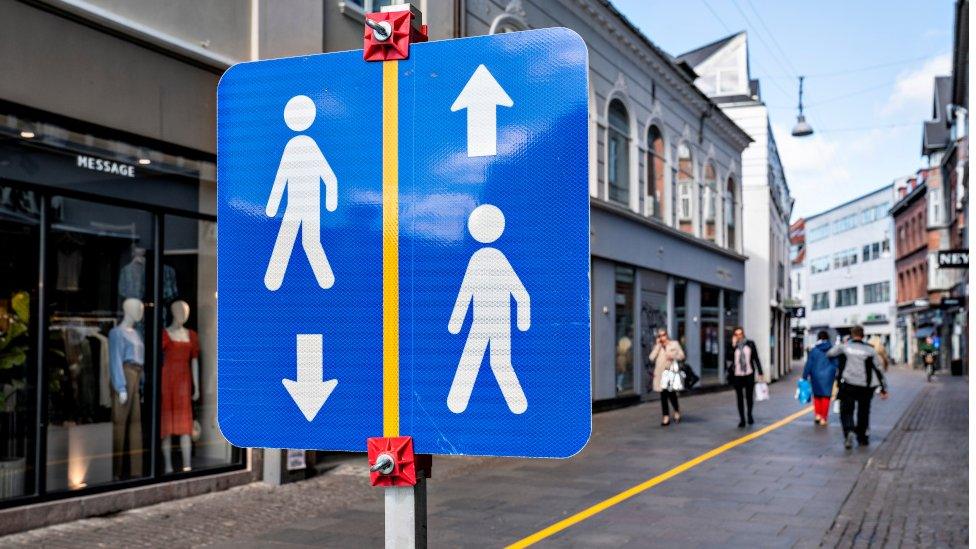Coronavirus: Why reopening French schools is a social emergency
- Published
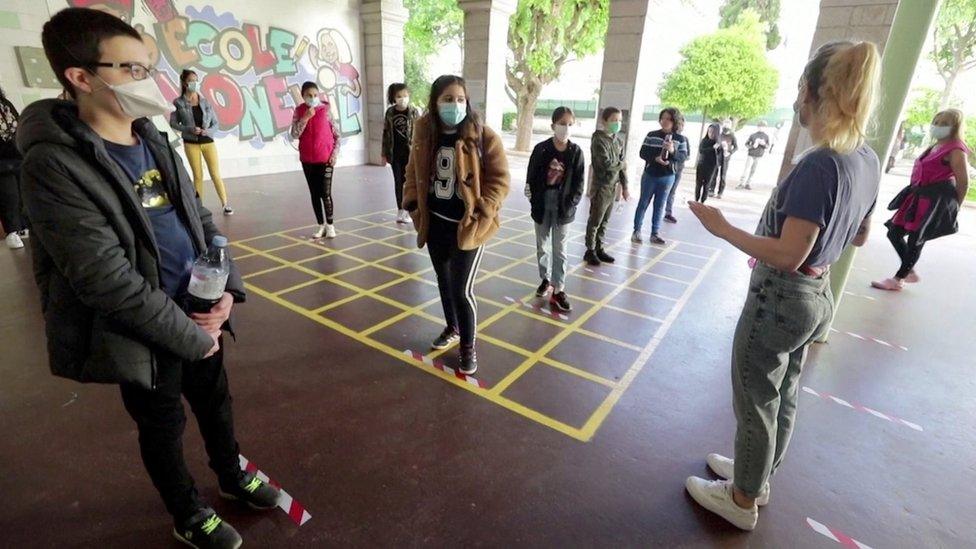
Primary schools and some middle schools have reopened with pupils following strict social distancing measures
It's obvious that a lack of schooling has increased inequalities, says France's Education Minister Jean-Michel Blanquer. "Social emergency" is the term he uses to describe the need to unlock the country's schools.
France started reopening its education system after lockdown with primary schools, because it was even more important for young people than for older pupils, he explained.
In the UK, there has been strong opposition to the government's plans to reopen schools in England on 1 June. Some scientists, councils and teachers' unions say it's too soon to welcome pupils back safely.
In France, 40,000 primary schools have reopened since lockdown was lifted on 11 May along with some middle schools.
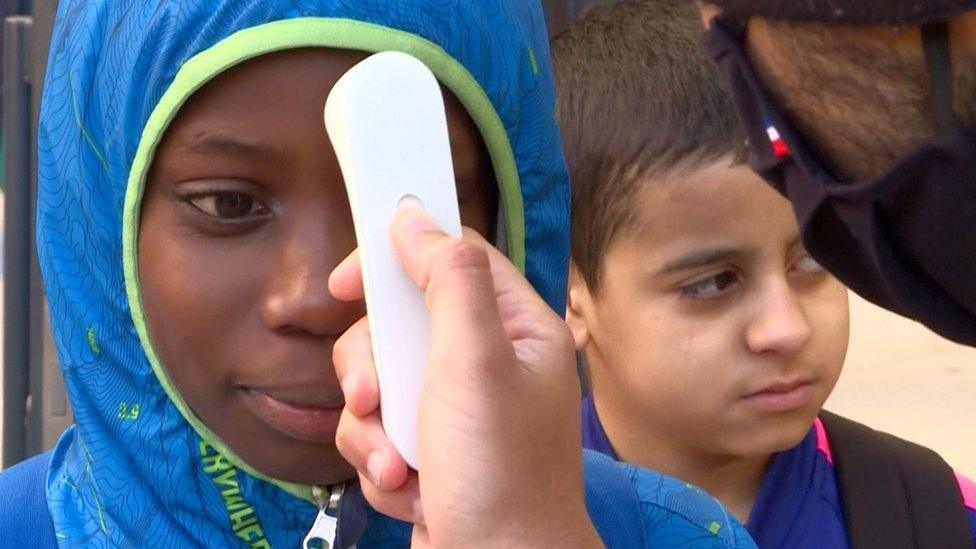
A child's temperature is taken on arrival at a school in Seine-Saint-Denis
So far, around one in five primary school pupils has returned to class. Mr Blanquer admitted that the children who had returned were often those from wealthier families.
"It's true that the children of poor families are coming less than the others," he said. "That's why it was important to start in May, not in June, because we know that it's [a] step-by-step [process] with poor families. It takes time to persuade people."
Why is there a social divide?
Fathia Sissani lives in Seine-Saint-Denis, a poor suburb of Paris that last month recorded the highest rate of coronavirus deaths anywhere in France.
She is a single parent to three children, two girls and a boy, aged between 11 and 14. She gave up work to look after her middle child, who is disabled.
Her youngest, Riya, has dropped out of school because it was too hard for him to follow the courses online at home.
"I'm a parent, not a teacher," says Fathia. "I grew up in Algeria so I studied in Arabic. I speak French well, but I don't understand lessons like maths or grammar."
Her internet connection has also been a problem. "I had to change provider because I didn't have a good signal," she explained. "I was having difficulty connecting to the school. Everyone is online. We tried for a bit, but I'd had enough of it."
Having everyone at home has been hard for Fathia. Her two daughters love school, but even though schools are reopening she isn't sending any of them back into class yet.
How Denmark reopened its primary schools
"I was among the first parents who said 'no'. I can't allow myself to take this risk," she says. "At school, there are lots of pupils; you can't watch everyone or follow all of them, you can't let them out to play. So I'm against the idea."
The town where school gates are staying shut
It's not yet compulsory for parents to send their child back to school in France, and many parents say they're nervous about it.
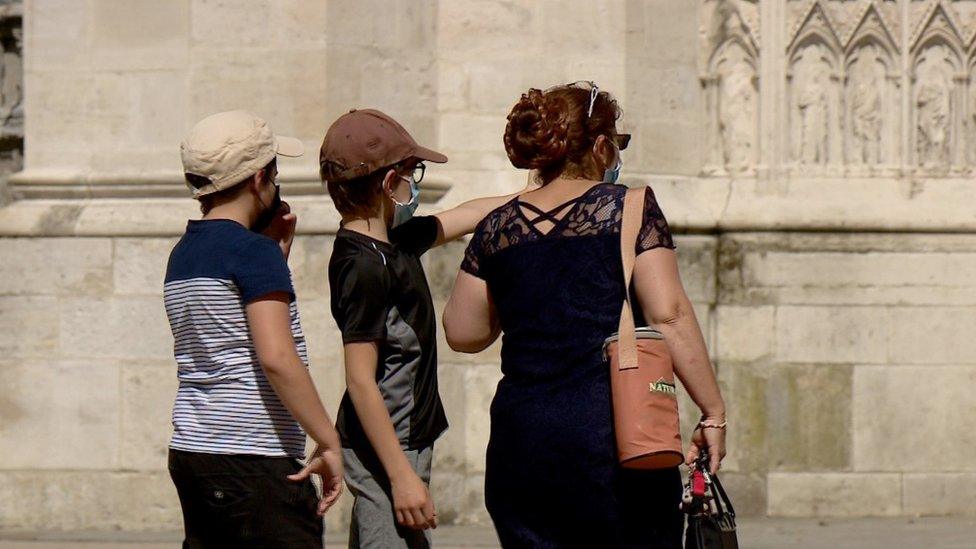
All the schools here in Sens are still shut
In Sens, a pretty market town 100km (62 miles) south of Paris, all the state primary schools have remained closed since lockdown was lifted because of three suspected cases of coronavirus reported by teachers. All have since tested negative.
The town's mayor, Marie-Louise Fort, says her decision to shut all 19 schools was very popular.
There's too much pressure on parents, she told me, because the government has asked each family to decide if their child should return to school.
Personally, I think it should have been compulsory, or not at all
"The way it is now creates guilt for the parents," the mayor explains. "If they put their children in school and they get sick, they'll feel guilty; if they keep them at home and they fall behind, they'll feel guilty. When you govern, you have to take clear decisions."
How the government is trying to get children to return
When I asked the education minister whether it was unfair to pass so much responsibility on to parents, he said the reasoning behind this decision was exactly the opposite.
It's impossible to say to a family that they are obliged to send their child back if they don't want to, in this kind of context
Even before the closures, more than 90% of parents in Sens told the local education department that they wouldn't be sending their children back to school. And most of the parents we spoke to in the town said they were still planning to keep their children at home.
"The best way to reassure parents that it's safe is other parents and other children," Mr Blanquer said. "The fact that the first 10 days have been a success is the best factor, because people see on TV that they're ok, they're happy to come back."
The education ministry has issued 56 pages of detailed instructions to schools on how to keep their premises clean and their pupils safe, in the hope of building trust.
There must be no more than 15 children in a class, no shared toys, and timed arrivals at school. Children over the age of 11 also need to wear masks.
This hairdressing salon reopened in Paris in May as France eased its lockdown
- Published12 May 2020
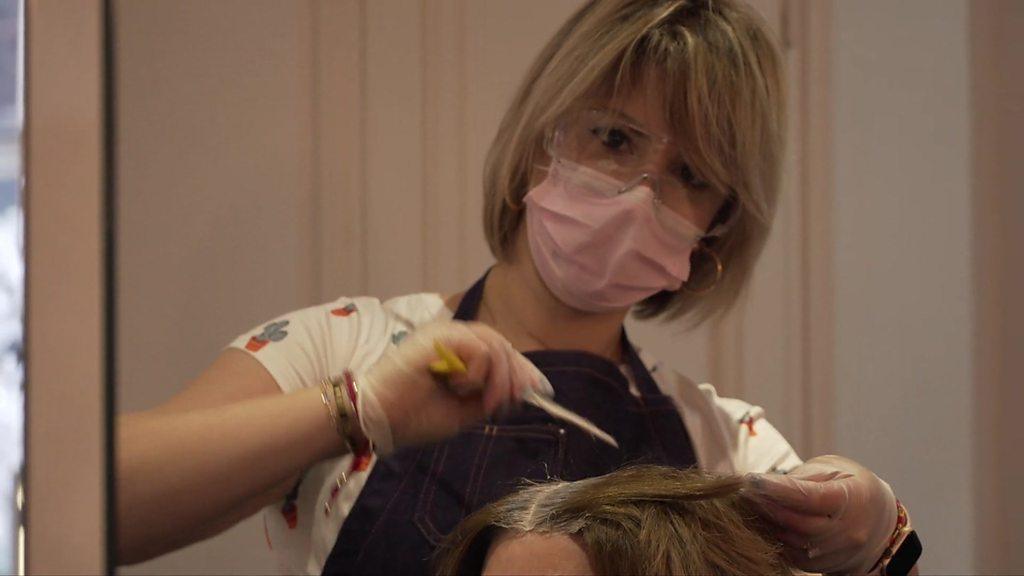
- Published2 July 2020
